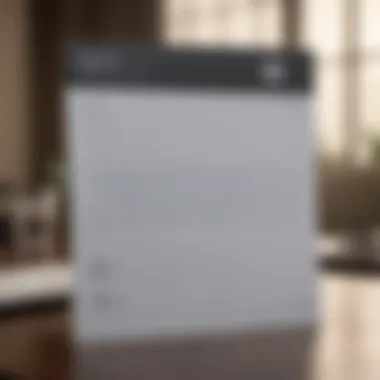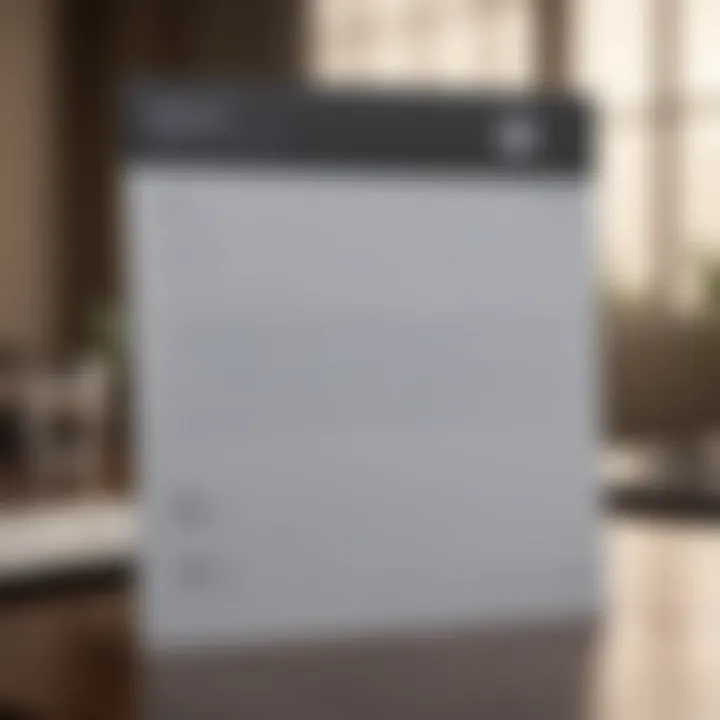Mastering the Art of Addressing HR Managers in Your Cover Letter: A Comprehensive Guide


Setting Financial Goals
In the realm of professional communication, setting clear goals is paramount to achieving success. When it comes to addressing an HR manager in a cover letter, the initial step revolves around defining your objectives with precision. By establishing specific aims for your correspondence, you equip yourself with a roadmap to steer your cover letter towards the desired outcome. These well-defined targets act as beacons, guiding your writing process and ensuring that your message aligns seamlessly with your intentions. Failure to set clear objectives may result in a lack of direction, leading to a cover letter that fails to resonate with the HR manager.
Budgeting and Expense Management
Once the goals are set, it is crucial to consider the budgeting and expense management aspect of addressing an HR manager in a cover letter. Effectively managing resources, in this case, your words and content, is akin to constructing a financial budget. Just as a well-organized budget allocates funds judiciously, a strategically crafted cover letter allocates information and tone thoughtfully. Highlighting essential skills and experiences while curtailing unnecessary details mirrors the practice of cutting costs in a personal budget. Additionally, utilizing tools like grammar checkers and peer reviews can assist in tracking your writing expenses and enhancing the efficiency of your communication.
Saving and Investing
Saving and investing in your cover letter can be equated to building an emergency fund for unforeseen circumstances. In the context of addressing an HR manager, showcasing adaptable skills and a forward-thinking mindset mirrors the principles of financial preparedness. Just as a diversified investment portfolio spreads risk, a cover letter enriched with varied experiences and competencies mitigates the chances of being typecast. Certain parallels also exist between exploring different investment options and tailoring your communication style to the specific HR manager and company culture. Strategies such as customizing each cover letter to emphasize different strengths resonate with the idea of diversifying your application approach.
Debt Management
Understanding the nuances of debt management holds relevance even in the realm of cover letter composition. Analogous to different types of debt, varying cover letter formats exist, each serving a distinctive purpose. For instance, a speculative cover letter addressed to an HR manager for a potential opportunity requires a different approach compared to an application targeted at a known job opening. Developing a repayment plan for your cover letter entails structuring your content in a manner that pays off for the reader, offering valuable insights and skills in a calculated manner. Moreover, exploring options for consolidating information and refining your writing style mirrors the optimization tactics involved in debt consolidation and refinancing strategies.
Retirement Planning
Extracting lessons from retirement planning sheds light on the importance of early preparation when addressing an HR manager in a cover letter. Just as prudent retirement planning secures financial stability in the future, meticulous crafting of your cover letter secures your professional trajectory. Knowledge of different retirement accounts draws parallels to the diverse array of communication channels available to engage an HR manager effectively, such as email correspondence or digital application portals. Maximizing the impact of your cover letter by aligning it with the company's values and ethos echoes the significance of maximizing retirement savings with employer contributions. By understanding the essence of retirement planning, you can navigate the terrain of cover letter composition with foresight and strategic acumen.
Introduction
In the realm of professional communication, the efficacy of addressing an HR manager in a cover letter engenders a significant impact on the trajectory of one's job application process. Mastering the nuances of this requisite skill can elevate a candidate's standing and convey a sense of attentiveness and respect crucial in the competitive landscape of job hunting. This article serves as a compass, guiding individuals through the labyrinth of addressing HR managers adeptly, with a focus on precision and professionalism.
Understanding the Importance of Addressing HR Managers
Significance of Proper Addressing
Properly addressing an HR manager injects a dose of formality and demonstrates dedication to details, underlining an applicant's meticulous approach towards professional interactions. This adherence to etiquettes showcases the candidate's seriousness towards the application and can set them apart in a pool of contenders. Moreover, it signifies a keen awareness of workplace decorum, portraying the individual as someone who values respectful communication, a quality highly esteemed in corporate environments.
Impact on Initial Impressions
The impact of correctly addressing an HR manager extends beyond mere politeness; it forges the initial impression that can steer the course of the subsequent interactions. Employing the appropriate salutation showcases an individual's acumen for protocol and sets a positive tone for the rest of the communication. In a scenario where first impressions hold substantial weight, this seemingly minor detail can wield considerable influence, potentially tipping the scales in favor of the applicant.
Overview of Cover Letter Structure


Opening Paragraph
The opening paragraph of a cover letter serves as the proverbial gateway, beckoning the HR manager into the applicant's narrative. It encapsulates the candidate's enthusiasm for the position, provides a snapshot of their qualifications, and sets the tone for the ensuing discourse. Crafting a compelling opening rests not only on laying a strong foundation for the letter but also on capturing the reader's interest from the outset, compelling them to delve further.
Body Content
The body of the cover letter acts as the canvas upon which the applicant paints their professional portrait. Each paragraph should expound on relevant experiences, skills, and achievements in alignment with the job requirements. Structuring the body content cohesively ensures a seamless flow of information, allowing the HR manager to navigate the applicant's credentials effortlessly and discern their suitability for the role.
Closing Remarks
Concluding the cover letter on a strong note is paramount. The closing remarks provide an opportunity to express gratitude for the HR manager's time and consideration, reaffirm interest in the position, and prompt further action. Crafting a memorable sign-off not only leaves a lasting impression but also cements the professionalism exhibited throughout the letter, leaving the reader with a favorable and lasting perception of the applicant.
Researching the HR Manager
In the realm of addressing an HR manager in a cover letter, the initial step involves meticulous research to unearth pertinent information. This section delves into the pivotal role of researching the HR manager, which sets the tone for a personalized and targeted communication approach. By understanding the individual behind the HR department, one can tailor the cover letter effectively. Through research, one can gain insights into the preferences, background, and professional experiences of the HR manager.
Identifying the Correct Name
Utilizing Company Resources
Embarking on the journey to identify the correct name of the HR manager can lead to fruitful outcomes. One effective strategy is to tap into the reservoir of company resources. Company directories, intranet portals, or organizational charts often house valuable information regarding the HR hierarchy. Leveraging these internal sources can unveil the elusive name and title of the HR manager. This method significantly enhances the personalization of the cover letter, establishing a strong connection from the outset.
Exploring Linked
In Profiles
Another avenue towards ascertaining the HR manager's identity is to explore Linked In profiles. In the digital age, LinkedIn serves as a goldmine of professional data. By scouring through profiles of company employees, one can pinpoint the HR manager with precision. Evaluating their profile can offer insights into their professional background, interests, and affiliations. This approach adds a layer of sophistication to the cover letter, demonstrating a proactive and meticulous attitude towards communication.
Verifying Pronunciation and Title
Checking with Receptionists
Ensuring the accurate pronunciation and title attribution of the HR manager reflects a nuanced level of respect and attention to detail. A subtle yet crucial step involves contacting receptionists within the organization. Receptionists can offer guidance on the pronunciation of names and provide clarity on professional designations. This gesture showcases a commitment to precision and professionalism in communication.
Referring to Official Websites


Cross-referencing information obtained from official websites can serve as a reliable method to verify the correct pronunciations and titles. Many companies display organizational structures and employee details on their websites. By referencing these official sources, one can confirm the accuracy of information regarding the HR manager. This verification process instills confidence in the sender and reinforces the integrity of the communication.
Formal Greetings
Formal greetings in a cover letter play a crucial role in setting the tone and establishing professionalism right from the start. They serve as the initial impression that the HR manager will have of you, making it essential to choose the right titles and salutations.
When addressing an HR manager, using proper titles such as Mr., Ms., or Dr. reflects respect and formality. These titles show that you acknowledge the recipient's status and expertise, contributing to a professional communication approach. Selecting the correct title demonstrates your attention to detail and cultural awareness, showcasing your commitment to creating a positive first impression. However, familiar terms should be avoided as they can convey a lack of professionalism and may come across as presumptuous.
Using Proper Titles
The choice between Mr., Ms., or Dr. in addressing the HR manager is fundamental in demonstrating your understanding of etiquette and respect for the recipient. Each title holds its unique significance, with 'Mr.' being commonly used for men, 'Ms.' for women, and 'Dr.' for individuals with a doctoral degree.
Describing the appropriate title is crucial as it sets the tone for the rest of the cover letter. Understanding the specific context in which each title is suitable ensures that your communication aligns with professional norms. While 'Mr.' and 'Ms.' are more commonly used in business settings, 'Dr.' is preferred when addressing individuals with advanced academic qualifications, emphasizing their expertise and accomplishments. The choice of title should be based on the recipient's preference and professional background, aiming to address them respectfully and accurately.
Avoiding Familiar Terms
In the context of formal greetings, avoiding familiar terms is imperative to maintain a professional and respectful tone in the cover letter. Terms like 'Hey' or 'Hi' might be perceived as overly casual and could diminish the seriousness of your communication. Opting for formal salutations sets the right atmosphere for a business interaction and indicates your professionalism and attention to detail.
Using familiar terms can create the impression that you lack awareness of proper business etiquette or that you are too informal in your approach. Sticking to traditional salutations shows that you understand the norms of professional communication and are mindful of portraying yourself in a respectful and appropriate manner.
Avoiding Generic Salutations
Generic salutations such as 'To Whom It May Concern' or 'Dear Hiring Manager' can detract from the personalization and specificity of your cover letter. While these salutations are commonly used when the recipient's name is unknown, they lack the personal touch that can make your application stand out.
When opting for 'To Whom It May Concern,' you risk sounding impersonal and detached from the hiring process. On the other hand, 'Dear Hiring Manager' is slightly better as it addresses the role directly, but it still lacks the individualization that personalized greetings can provide. Personalizing your salutation by addressing the HR manager by name, if possible, demonstrates initiative and attention to detail, signaling your genuine interest in the position.
Crafting a cover letter with a personalized and tailored approach can significantly enhance your candidacy by showcasing your professionalism, research skills, and genuine interest in the opportunity. By paying attention to formal greetings and avoiding generic salutations, you can effectively grab the HR manager's attention and make a positive impression right from the beginning.
Personalized Approaches
In this meticulous section about Personalized Approaches, we delve into the strategy of customizing your cover letter to establish a more profound connection with the HR manager. By tailoring your content to the specific recipient, you showcase genuine interest and effort, setting yourself apart from generic applications. This personalized touch demonstrates your attention to detail and your commitment to the application process. While crafting these customized elements, you ensure that your cover letter resonates with the HR manager on a personal level, increasing the likelihood of a positive response.
Referencing Shared Connections
Mentioning Mutual Contacts


Digging into Mentioning Mutual Contacts, we uncover a strategic avenue to strengthen your cover letter. By referencing individuals you both know, you create a sense of familiarity and trust. This approach leverages existing relationships to establish credibility and enhance your chances of standing out. The subtle yet impactful nature of this method can significantly elevate your application's reception, resonating positively with the HR manager. However, one must tread carefully to ensure relevance and appropriateness.
Highlighting Common Interests
Exploring Highlighting Common Interests further enriches your communication strategy. By highlighting shared hobbies or professional passions, you humanize your application, fostering a sense of camaraderie with the HR manager. This approach goes beyond qualifications, emphasizing cultural fit and compatibility. Showcasing common interests can serve as an icebreaker, sparking engaging conversations during interviews and solidifying your place as a candidate of interest. Yet, it is crucial to balance personalization with professionalism to maintain a polished image.
Linking Experiences to Job Requirements
Aligning Skills with Position Needs
Strategizing on Aligning Skills with Position Needs uncovers a critical aspect of crafting a compelling cover letter. By demonstrating how your competencies align with the job requirements, you present yourself as a tailored fit for the role. This method underlines your value proposition, showcasing your ability to meet the company's needs effectively. Skill alignment communicates your understanding of the position's demands and your readiness to contribute meaningfully, positioning you as a capable and valuable candidate. However, effective execution necessitates a detailed analysis of the job description and a clear presentation of your relevant experiences.
Demonstrating Fit for the Role
Delving into Demonstrating Fit for the Role sheds light on the process of showcasing your suitability for the position. By illustrating how your experiences, qualifications, and aspirations align with the role, you provide concrete evidence of your potential contribution. This tailored approach reinforces your motivation and compatibility with the organization, aligning your career trajectory with the company's objectives. Demonstrating fit for the role not only bolsters your credibility but also reinforces your commitment to long-term success within the company. Nevertheless, articulating this fit requires a nuanced blend of self-awareness and research to resonate effectively with the HR manager.
Polite and Professional Tone
In the realm of cover letters, maintaining a polite and professional tone is of utmost significance. It is the initial step towards establishing a positive impression on the HR manager. By adhering to a courteous and professional language, applicants showcase respect for the recipient, reflecting their professionalism and suitability for the role. Maintaining a polite and professional tone underscores the applicant's understanding of workplace etiquette and enhances the overall effectiveness of the cover letter.
Maintaining Respectful Language
Avoiding Overly Casual Phrases
Steering clear of overly casual phrases is essential in maintaining a respectful tone throughout the cover letter. Doing so elevates the seriousness of the communication and aligns with the formalities expected in professional correspondence. Avoiding informal language or slang demonstrates the applicant's recognition of the importance of the application process and the gravity of the opportunity at hand. By eradicating casual expressions, applicants position themselves as serious contenders, thereby enhancing their chances of being considered for the position.
Using Polite Closing Regards
Utilizing polite closing regards serves as a final touch to the cover letter, leaving a lasting impression on the HR manager. By incorporating courteous closing statements, applicants convey gratitude for the reader's time and consideration. Polite closing regards contribute to a positive closure, leaving the recipient with a favorable perception of the applicant. This polite conclusion emphasizes the applicant's professional aptitude and attention to detail, factors that are highly valued in candidate evaluation. Ultimately, using polite closing regards adds a final layer of respect and professionalism to the cover letter, solidifying the applicant's candidacy.
Showing Enthusiasm and Gratitude
Expressing enthusiasm and gratitude throughout the cover letter is paramount in conveying genuine interest and appreciation for the opportunity presented. By infusing the letter with enthusiasm, applicants exhibit motivation and genuine excitement for the prospect of joining the organization. Expressing gratitude demonstrates humility and appreciation for the consideration extended by the HR manager, fostering a positive rapport. Overall, showing enthusiasm and gratitude not only enhances the sincerity of the application but also cultivates a sense of authenticity and eagerness that can set the applicant apart from other candidates.
Expressing Sincere Interest
Conveying sincere interest in the position and company showcases a genuine desire to contribute and grow within the organization. By articulating specific reasons for being drawn to the role, applicants establish a personal connection with the reader. Expressing sincere interest reflects a proactive approach and a willingness to invest time and effort into the role, traits highly valued by employers. This authenticity in expressing interest helps build credibility and showcases the applicant's potential cultural fit within the company.
Thanking for Consideration
Extending thanks for the consideration of their application is a gracious gesture that emphasizes humility and appreciation. By acknowledging the HR manager's time and effort in reviewing the application, applicants demonstrate politeness and respect. Thanking for consideration also leaves a positive final impression, indicating professionalism and gratitude. This simple act of gratitude can leave a lasting impact on the recipient, potentially influencing their perception of the applicant. In essence, expressing thanks for consideration is a small yet powerful way to end the cover letter on a positive note and maintain a courteous tone.



